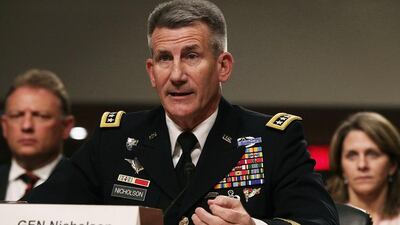KABUL // Afghanistan on Friday endorsed US general John Nicholson’s call for thousands of additional troops in Afghanistan to stave off a resurgent Taliban, ahead of what is expected to be another intense fighting season.
Beset by record casualties, desertions and “ghost soldiers” who do not exist on the payrolls, Afghan forces are struggling to rein in the Taliban since US-led Nato troops ended their combat mission in December 2014.
“We welcome the proposal of deploying thousands of additional troops to Afghanistan to effectively train and advise Afghan forces,” said Dawlat Waziri, the defence ministry spokesman in Kabul. “The war in Afghanistan is a war against terrorism and we want this war to reach a successful end. In that regard we think this is a positive step.”
There are currently more than 13,000 Nato troops – including 8,400 US forces – deployed in Afghanistan for training and counterterrorism, down from a peak of about 140,000 in 2011. But Gen Nicholson, the top US commander in Afghanistan, told the US congress that thousands of extra coalition troops were needed to break the war out of a stalemate.
It was reported that in a recent telephone call to Afghanistan’s president Ashraf Ghani, Mr Trump said he would consider sending more troops. The White House said the pair spoke again on Thursday to “discuss opportunities to strengthen the bilateral relationship in areas such as security, counterterrorism cooperation”.
But spokesman Sean Spicer said the president would consult defence secretary James Mattis before deciding on Gen Nicholson’s request for reinforcements.
The debate over troop numbers underscores concerns over the worsening security situation in Afghanistan, with insurgents threatening several provincial capitals amid anxiety that Pakistan, Russia and Iran were actively propping up the militants.
Aside from additional troops, local observers say the US war strategy in Afghanistan should include sustained pressure on Pakistan to stop harbouring insurgents.
“Nearly 16 years of war and billions of dollars could not bring peace and stability to war-torn Afghanistan,” said Mia Gul Waseeq, a Kabul-based analyst. “How will a few more thousand troops bring sustainable peace in a way that more than 100,000 troops could not?”
* Agence France-Presse

